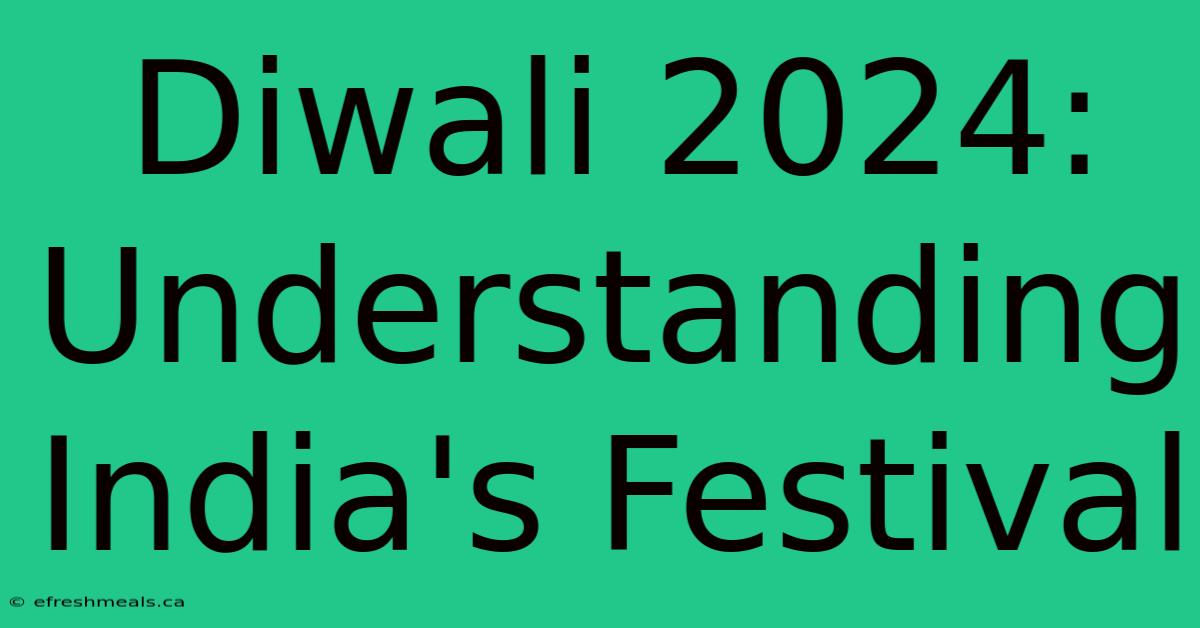Diwali 2024: Understanding India's Festival

Discover more detailed and exciting information on our website. Click the link below to start your adventure: Visit Best Website nimila.me. Don't miss out!
Table of Contents
Diwali 2024: Understanding India's Festival of Lights
Have you ever wondered what makes Diwali so special? Beyond the dazzling lights and festive cheer, Diwali, also known as Deepavali, is a cultural tapestry woven with stories of triumph, hope, and the symbolic victory of good over evil.
Why It Matters: Diwali is one of India's most significant festivals, celebrated with immense fervor across the country and by the global Indian diaspora. Understanding its historical and cultural significance sheds light on the values and traditions that shape Indian society.
Key Takeaways of Diwali
| Aspect | Description |
|---|---|
| Significance | Marks the victory of Lord Rama over Ravana, celebrating the return of good to Ayodhya. |
| Timing | Falls on the darkest night of the lunar month of Ashwin or Kartik (typically October or November) |
| Duration | Celebrated for five days, each day holding unique significance |
| Key Rituals | Lighting diyas (oil lamps), decorating homes with rangoli (colorful patterns), bursting firecrackers, exchanging gifts, and enjoying traditional sweets |
| Religious Context | Celebrated by Hindus, Jains, and Sikhs, each with their own interpretations and rituals |
Diwali 2024: A Deeper Dive
Diwali: A Celebration of Triumph
Diwali's origins are deeply rooted in Hindu mythology. It commemorates the return of Lord Rama, the exiled prince, to his kingdom of Ayodhya after fourteen years of exile. His victory over the demon king Ravana symbolizes the triumph of righteousness, knowledge, and good over evil, ignorance, and darkness.
The Five Days of Diwali
Each day of Diwali holds a unique significance:
Day 1: Dhanteras: Celebrates wealth and prosperity. People purchase new utensils, jewelry, and other items symbolizing auspicious beginnings.
Day 2: Choti Diwali: Also known as Naraka Chaturdashi, this day is dedicated to eliminating negative energies. People light diyas, perform puja (worship), and share stories of Lord Krishna's victory over the demon Narakasura.
Day 3: Diwali: The main festival day, marked by the illumination of homes with diyas, decorating with rangoli, bursting firecrackers, and enjoying traditional sweets.
Day 4: Padwa: Celebrates a new beginning. Wives traditionally apply a red tilak (mark) to their husbands’ foreheads, signifying love and respect.
Day 5: Bhai Dooj: A day dedicated to celebrating the bond between siblings. Sisters perform a ritual for the well-being of their brothers.
The Cultural Tapestry of Diwali
Diwali is not merely a religious festival; it's a vibrant celebration that weaves together various aspects of Indian culture:
-
Mythology: The stories of Lord Rama and his victory over Ravana serve as a constant source of inspiration and moral guidance.
-
Art and Crafts: Rangoli patterns, diyas, and decorations showcase the artistic skills of Indian artisans.
-
Culinary Delights: Traditional sweets like laddu, gulab jamun, and barfi add to the festive cheer.
-
Family Values: Diwali strengthens family bonds and fosters a sense of community.
-
Environmental Impact: While firecrackers are a traditional part of Diwali, there's growing awareness about their environmental impact, leading to alternative ways of celebration.
Diwali 2024: Looking Ahead
Diwali 2024 promises to be another vibrant celebration of this multifaceted festival. As India and the world embrace the festive spirit, it's a time to reflect on the values of goodness, knowledge, and unity that Diwali stands for.
FAQ for Diwali
| Question | Answer |
|---|---|
| When is Diwali celebrated? | The date varies each year based on the lunar calendar, typically falling in October or November. |
| What is the significance of lighting diyas? | Diyas symbolize light, dispelling darkness and ignorance. |
| Why are firecrackers burst on Diwali? | They represent the joyous celebration of good over evil. |
| How is Diwali celebrated in different parts of India? | While the core rituals remain similar, regional variations in food, customs, and decorations add to the diversity of celebrations. |
| What are the environmental concerns related to Diwali? | Air pollution caused by firecrackers is a major concern. |
| How can we celebrate Diwali sustainably? | Opting for eco-friendly firecrackers, using LED lights, and minimizing waste are some sustainable practices. |
Tips for a Meaningful Diwali
- Embrace the cultural heritage: Learn about the stories and traditions behind Diwali.
- Light up your home with diyas: Enjoy the traditional way of illuminating your home with the warm glow of diyas.
- Share the joy with loved ones: Celebrate Diwali with family and friends, exchanging gifts and sharing traditional sweets.
- Spread kindness and goodwill: Use Diwali as an opportunity to reach out to those in need and promote peace and harmony.
- Consider environmental impact: Choose sustainable ways to celebrate, minimizing your environmental footprint.
Summary by Diwali
Diwali is more than a festival of lights; it's a celebration of hope, courage, and the enduring triumph of good over evil. As we celebrate Diwali 2024, let's embrace the spirit of this festive occasion and spread joy, light, and positivity in our communities.
Let the light of Diwali illuminate your life!

Thank you for visiting our website wich cover about Diwali 2024: Understanding India's Festival. We hope the information provided has been useful to you. Feel free to contact us if you have any questions or need further assistance. See you next time and dont miss to bookmark.
Featured Posts
-
Pet Halloween Costume Ideas 2023
Nov 01, 2024
-
Texans Vs Jets Expert Week 9 Picks
Nov 01, 2024
-
Kelly Clarksons Wild Style Change
Nov 01, 2024
-
Halloween Pet Costume Inspiration
Nov 01, 2024
-
Jets Face Texans Seek To End Losing Streak
Nov 01, 2024
